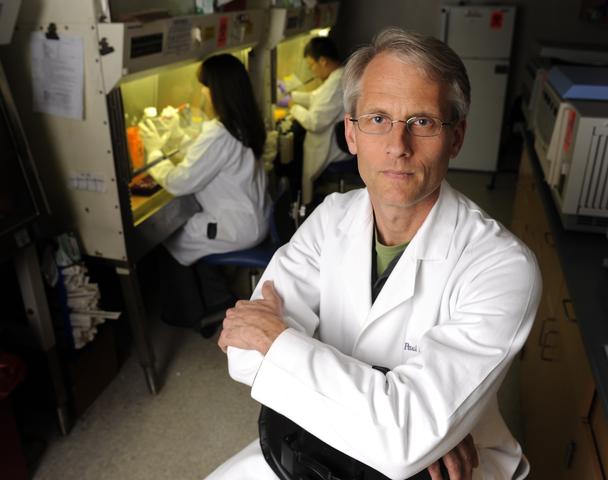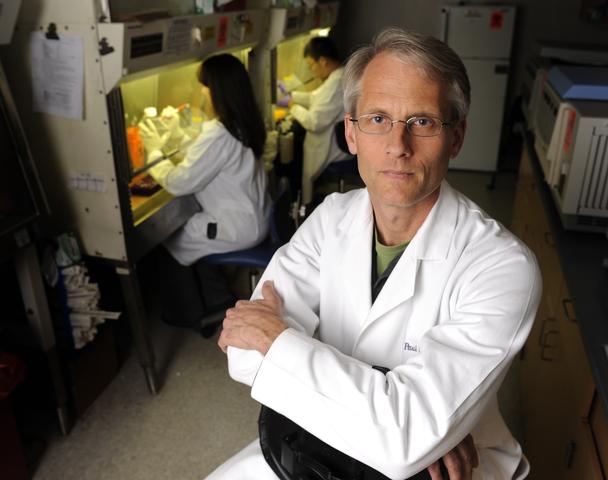
BIRMINGHAM, Ala. – Human immunodeficiency virus is known to be a highly variable virus that adapts to a person’s immune response during the lifetime infection, and a new study published in Nature Medicine shows that viral adaptation in HIV can predict a person’s current disease status, as well as the degree to which newly transmitted HIV-1 is adapted to their new host.
By using a novel method to measure the extent of adaptation of a virus to a person’s cellular immune response, the investigators were able to predict how rapidly the disease will progress in that person.
The cellular arm of the immune response, through CD8+ T-cells, eliminates HIV-infected cells. These T-cells are activated by pieces of the virus, peptide epitopes, presented on the human leukocyte antigen proteins on the surface of antigen-presenting cells. HLA is a cell surface protein that is one of the most polymorphic variable parts of the human genome, as unique as each person’s DNA.
Some spontaneous mutations in HIV change the epitopes, the antigens to which a T-cell binds, so that the HLA proteins no longer present them effectively, and no longer stimulate an immune response. This process of viral adaptation is constantly occurring, and some adaptations persist even after sequential transmissions to new individuals.
An international team, led by scientists from Microsoft Research, the University of Alabama at Birmingham and Emory University, uses a model to quantify viral adaptation, showing that being infected by a virus highly adapted to their immune response is highly detrimental to that individual.
“Individuals who had the bad luck of being infected by a pre-adapted virus progressed three times faster to low CD4 counts and had much higher viral loads,” said Jonathan Carlson, Ph.D., senior researcher at Microsoft Research.
The researchers show that epitopes that are adapted are poorly recognized by the immune system when they are transmitted to individuals, and even when the adapted epitope is recognized, the immune response is much less effective at killing infected cells.
In this way, parts of the virus that would normally trigger an immune response are invisible to key components of the immune system, suggesting that universal holes exist in the immune response.
“If we can’t get functional responses to those adapted epitopes in the context of natural infection, it will be quite the challenge to get responses induced by a vaccine candidate,” said Dr. Eric Hunter, professor of pathology at Emory University.
An analysis of immune responses measured in the Step HIV vaccine trial showed that the more adapted the vaccine candidate, the poorer the response.
“As vaccines are developed for prevention of HIV, it is important to think about how we are designing it,” said Paul Goepfert, M.D., director of UAB’s Alabama Vaccine Research Clinic. “To get the immune system to respond to the vaccine, you have to think about its response to the adapted form of HIV, and focus on those parts of the virus that are most difficult to undergo adaptation.”
“The ideal vaccine would produce antibodies and cell-mediated responses,” Goepfert said. “We haven’t optimized vaccines to be nonadapted to see if they would improve efficacy.”
While the number of infections seen within the United States has decreased over the past 10 years, there are still more than 50,000 new infections each year. Effective therapy to treat HIV has been available for almost 20 years, but developing better prevention methods is essential in decreasing or ending the number of cases of infection.
###
This study was a collaborative effort, involving an international team of scientists. Led by Carlson, Hunter and Goepfert, the project included data from more than 4,000 HIV infection subjects, and involved investigators from IAVI, Oxford University, Simon Fraser University, the University of Kwazulu Natal, the Ragon Institute of MGH, Massachusetts Institute of Technology and Harvard, Murdoch University, the British Columbia Centre for Excellence in HIV/AIDS, Gilead Sciences, the Zambia-Emory HIV Research program, and the La Jolla Institute of Allergy and Immunology. The team has released their machine learning models to the community at http://phylod.research.microsoft.com.
About UAB
Known for its innovative and interdisciplinary approach to education at both the graduate and undergraduate levels, the University of Alabama at Birmingham is the state of Alabama’s largest employer and an internationally renowned research university and academic medical center; its professional schools and specialty patient-care programs are consistently ranked among the nation’s top 50. UAB’s Center for Clinical and Translational Science is advancing innovative discoveries for better health as a two-time recipient of the prestigious Center for Translational Science Award. Find more information at http://www.uab.edu and http://www.uabmedicine.org.
EDITOR’S NOTE: The University of Alabama at Birmingham is a separate, independent institution from the University of Alabama, which is located in Tuscaloosa. Please use University of Alabama at Birmingham on first reference and UAB on all subsequent references.
VIDEO: http://www.youtube.com/uabnews TEXT: http://www.uab.edu/news TWEETS: http://www.twitter.com/uabnews
Media Contact
Alicia Rohan
[email protected]
205-975-7515
http://www.uab.edu
The post HIV vaccine design should adapt as HIV virus mutates appeared first on Scienmag.





